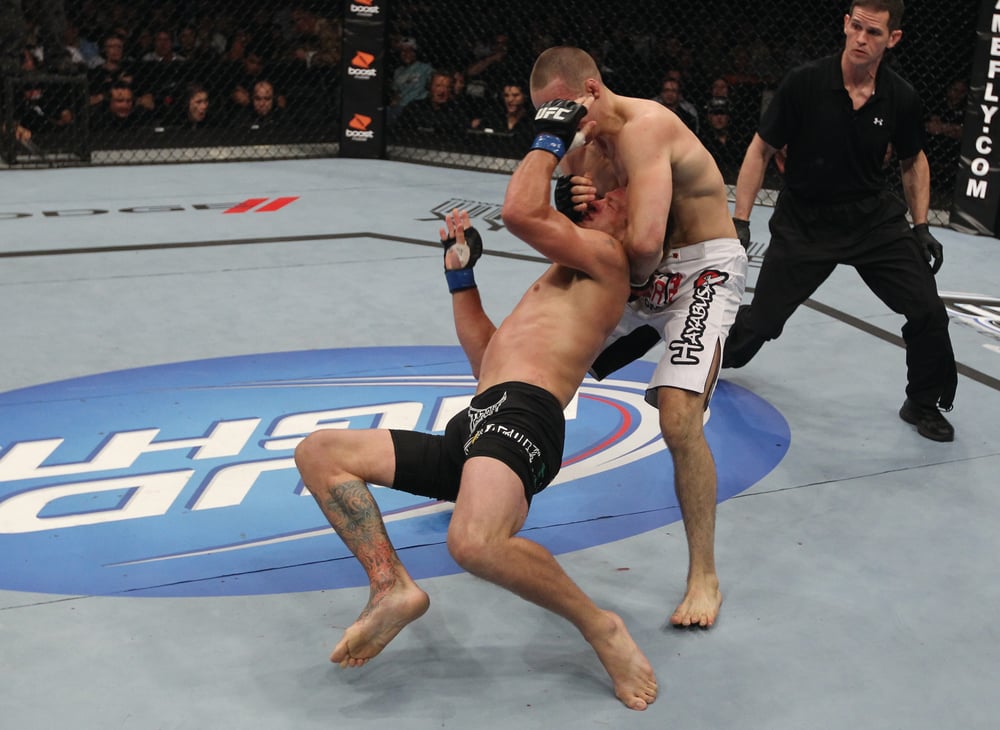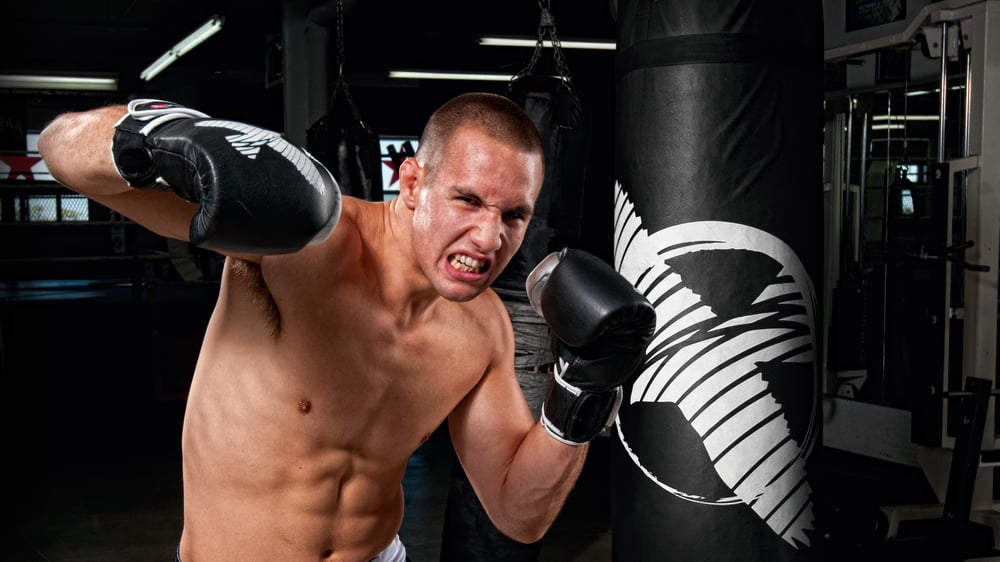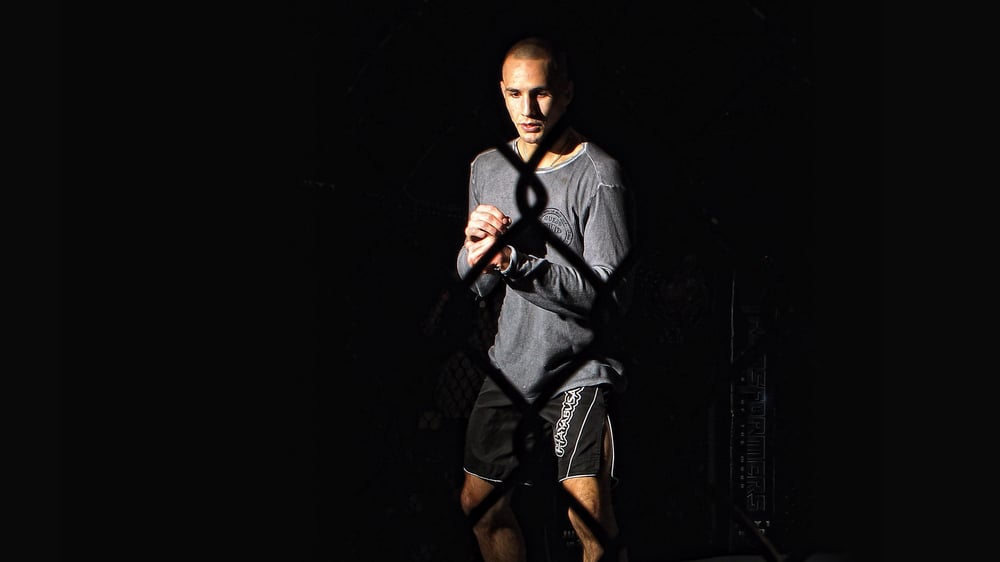
Issue 083
December 2011
Tipped by pundits and pros, and dubbed by the UFC’s Joe Rogan as having more potential than UFC 170lb king Georges St Pierre, is Rory MacDonald MMA’s next Superman?
Rory MacDonald graduated from high school four years ago. In mid-2010, at 21 years old, an age where some are settling onto easy street under their parents’ roof, the welterweight picked up and moved nearly 2,900 miles across Canada – on his own. It had taken much deliberation with his manager and longtime coach David Lea, but his relocation from his home in Kelowna, British Columbia, to Montreal, Quebec, meant he began training with many of the same coaches who had helped his friend and then-casual training partner, UFC welterweight champion Georges St Pierre win back his belt from Matt Serra.
Firas Zahabi and Eric O’Keefe focused on his overall MMA game, Bruno Fernandes honed his jiu-jitsu skills, Howard Grant dialed in his boxing prowess, Jonathan Chaimberg made sure his strength and conditioning was at peak performance, and training at the Montreal Wrestling Club alongside some of the province’s top national team members brought his wrestling game to a whole other level. He quickly realized that he had made the right, albeit difficult, decision to move to ensure his future in the sport.
The results were immediate. Although he had been Canadian MMA’s best-kept secret for the past few years, his routings against Nate Diaz and Mike Pyle to take his record to 12-1 (3-1 in the UFC) soon had people talking about MacDonald. However, not all the chatter was positive.
There were whispers and then screams that the fast-rising kid who was beating veterans with double and triple the experience must be taking performance-enhancing drugs. How else, his detractors asked, could a 22-year-old be seemingly growing bigger, faster and stronger than his more well-known opponents?

At first, Rory says, he took the finger-pointing and accusations to heart, but knowing that he achieved all of his career goals thus far honestly and within the rules, he learned one of several valuable lessons to come from the experience of being wrongfully tarred and feathered by a handful of fans and members of the media.
“I took it really personally because I work so hard and I want to put on a show and to be a fan favorite. I used to try to make everyone happy from the fans, to my team and coaches to the UFC. I have a lot more supporters than I have haters, but I’ve come to understand that those guys are always going to be around and they’re probably miserable about their own lives,”
MacDonald explains. “There are always going to be idiots out there. At the end of the day, I’m happy with what I’m doing. I’m doing everything honestly and that’s what matters.”
The allegations are a double-edged sword in a sense. On one hand, MacDonald, who says he typically walks around at 200lb between fights, says it’s flattering that the hours he spends in the gym putting in grueling work, day in and day out with Chaimberg, are obviously paying off. Being called a cheat, he points out, however, diminishes the effort. Still, Rory is adamant he won’t let the false allegations tarnish his ensuing legacy.
“People don’t take into account that I’m as young as I am. I’m still growing. I’m just over 20 years old and I’ve always been a late bloomer. When I was 17 most people thought I was 14 because I still looked like a kid. My whole family is the same. We all developed a little bit later in life. Everyone develops at a different rate and people don’t seem to take that into consideration.
“They just want something to explain why a guy as young as I am is having as much success as I am because it’s rare. I pass all of my drug tests and I’ll never fail, even if a commission decides to test me randomly when I haven’t got a fight coming up. I know the truth and I know I’m no cheater. Fighting is my life and it has been for a long time. I know if I’m true to myself and true to the sport it will be true to me.”
Something else he did for himself was to do away with his old nickname, ‘The Waterboy.’ The moniker, which was bestowed upon him in his early teens in reference to his penchant for letting his anger get the best of him in training similar to the Adam Sandler character from the movie of the same name, didn’t seem to fit anymore. He was no longer a boy and had learned to be patient, to control his anger and to not fight with as much emotion as he had in the past, and as such, he decided that the nickname had run its course soon after his UFC 129 win over Diaz.
He decided to lay the now inaccurate appellation to rest and instead christen himself with the more appropriate sobriquet, ‘Ares,’ due to several similarities he shared with the Greek god of war. As expected, the decision to bestow himself with a new nickname drew the ire of his detractors, but, like his namesake, Ares didn’t care what people thought.
“Every performer has a stage name and I felt like The Waterboy didn’t fit. I’m a lot more mature and focused now and I think my patience has become one of my biggest assets. Ares is the Greek god of war and I thought it was a lot more fitting, so I went with it,” he recalls. “I didn’t really care what anyone thought; it was something I did more for myself. I liked his story.”

Like Ares, MacDonald had left home at an early age. When he was 16 and on the cusp of starting his professional career in the cage, his father accepted a job outside of British Columbia but Rory was comfortable where he was at school and training at Team Toshido, where he had spent the past two years honing his craft in anticipation of his pro debut. He knew that leaving the province would stall his progress, so instead of moving with his dad or in with his mom in Vancouver, he made the decision to stay in Kelowna to finish school and continue with his training under coach David Lea.
Another parallel between Rory and Ares’ lives was the split of admirers and haters. One of the youngest gods in Greek mythology, Ares was known for his brutal fighting prowess. His ferocity and bloodthirst garnered him the love and respect of those he was fighting for, but also elicited the hatred of those he was fighting against. The son of Zeus paid his critics no mind and instead continued to blaze his own trail regardless of what others thought of him or his decisions. This frame of mind, MacDonald says, has helped him to mentally reach the next level as a fighter.
“I’ve really changed my focus on how I approach training and fighting,” he says. “I guess you could say I’ve experienced a lot of growth. I’m not doing this for anybody but myself now. I have goals that I’ve set that I want to achieve and I’ll achieve them all. That’s it. I think the biggest thing I’ve done is I’ve become a lot more experienced and comfortable in the UFC. There are no surprises anymore and there’s nothing new I have to deal with. I’ve fought in front of my biggest fan base in Vancouver and now every crowd has been much easier since then, even the massive one I fought in front of in Toronto. It’s pretty tough to let the crowd or the big lights in any other city get to me when I went through fighting in front of my hometown crowd and stayed focused.”
MacDonald’s next opportunity to stay focused will come December 10th at UFC 140, back in Toronto, where he’ll take on Brian Ebersole – a fighter who let reporters know in no uncertain terms following his UFC 133 win over Dennis Hallman that he had no interest in facing a fighter with little or no name recognition like Rory. A year ago, an off-the-cuff comment like this would have flipped on the switch in The Waterboy, but Ares takes Ebersole’s diss in stride and dissects his soon-to-be opponent’s words as if he were breaking down his technique in the cage.
“I didn’t hear that he said that. You’re the first one that told me about it. I never pay attention to that s**t. Now that I hear that he said that, I think that he’s probably just worried that he’s going to lose to a guy without as big of a name as the guys he’s beaten. A lot of people are afraid to fight me right now because not a lot of people know me and I’m probably the best guy in the division,” he says matter-of-factly.
“Why would they want to fight me if there’s a pretty good chance that they’re going to lose? They’re going to fight someone with a lesser-known name and they’re going to get hurt. I understand where he’s coming from. It comes out of fear that he would say that. It’s not that he wants to fight someone better, because I’m the best guy he’s going to fight and he’s not going to do well.”

As far as preparing for the seasoned vet whose unorthodox bag of tricks includes a cartwheel kick he has employed to destruct more than one opponent, MacDonald says he’s keeping his preparations basic. “I don’t really know too much about him and I’d like to keep it that way,” he explains. “I don’t really care. I focus more on what I have to do to ensure that I’m at my best... If I do that I know that I’m going to neutralize everything he does and I’m going to beat him. That’s the only thing I have in my mind. If he tries that cartwheel kick, I’ll defend it and I’ll counter. Whatever. It doesn’t matter what he brings. I’m ready for anything.”
One thing he’s not ready to do, and likely never will be, he says, is to fight for the UFC welterweight strap if St Pierre, who he now counts as one of his dearest friends and most valuable training partners, still owns it. “The answer is always the same: Georges is one of my best friends,” he points out. “He’s taken great care of me since I moved here to Montreal. It’s not happening.”
A word of advice if you ever meet the talented, affable and polite Canadian: don’t refer to him as ‘the next Georges St Pierre.’ He’s not big on the comparison, even though he gets the sentiment behind it. “I understand that people think it’s a compliment to compare me to Georges. It’s nice to hear that they think as highly about me as they do him, but I really hope that they aren’t mixing me up with Georges, because I’m bringing something new to the table that nobody else has. I hope I can demonstrate that in some of my future fights to differentiate myself and separate my name from everyone else,” MacDonald asserts.
“I’m not here to copy Georges or to do the same things that Georges has done in the sport. I’m here to do my own thing and to make a name for myself. I knew that people would see one day that I was a fighter. I didn’t necessarily want to prove anything to anyone, because that’s not why I fight. I’m here to accomplish my own goals.”
And, to all of his haters, MacDonald has a simple message: “For anyone who never believed in me or who said bad things about me that I don’t deserve, I know that down the road I’m going to accomplish things that nobody will be able to criticize, so whatever they want to say doesn’t bother me. I’ve done this alone and I’m going to finish this alone in the cage and nothing anyone says or does is going to have any effect on what I do in there.”










